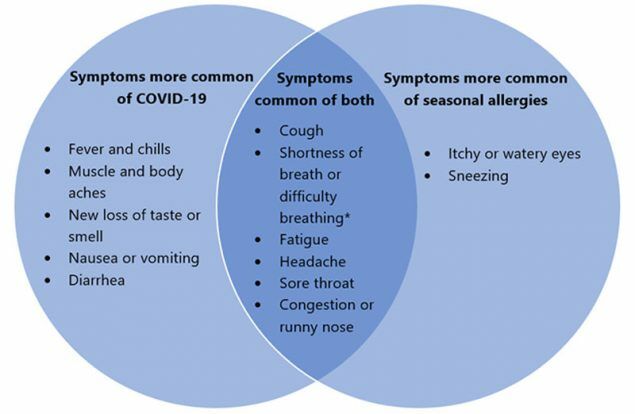
COVID-19 and allergies can sometimes share similar symptoms, such as a dry cough, sore throat, headaches and difficulty breathing. A D.C. infectious diseases expert has tips to help avoid the confusion.
“Most people who have allergies know what their allergy symptoms are — so the thing that I would advise is to look for something that is outside those symptoms,” said Dr. Maria Elena Ruiz, an infectious diseases specialist at MedStar Washington Hospital Center.
Fever — “With allergy attacks, you wouldn’t expect a fever,” Ruiz said.
Headache — “People with COVID-19 get headaches, and usually the headache is pretty severe and associated with fever,” Ruiz said. Uncomfortable headaches related to allergy attacks and congestion tend to be behind the eyes and sinuses.
Fatigue — Fatigue can be associated with allergy attacks but when resulting from the virus, it can be severe. “People with COVID will have a more profound fatigue where they can’t get out of bed,” Ruiz said.
Itchiness — Allergies can cause itchiness in your ears, throat and eyes. Itchiness is not a symptom of a viral illness. “In COVID-19, there can be irritation of the eyes and teary eyes, but that’s kind of unusual. I would consider that more consistent with allergies,” Ruiz said.
Medicine — People who typically succumb to seasonal allergies should be mindful about avoiding allergies and taking their medications.
“Actually take their medicines instead of waiting for the allergies to set in, so that they can avoid that confusion and stress of trying to sort it out,” Ruiz said. “Take the medicines. It’s something that I do precisely because I don’t want to come to the hospital and be coughing and sneezing and making people nervous.”
Finally, Ruiz cautions that COVID-19 still is circulating and infecting people; you should continue to take precautions. And, remember that the vaccine doesn’t take effect until two weeks after the second dose if it’s a two-shot vaccine.
- Sign up for WTOP alerts
- Latest coronavirus test results in DC, Maryland and Virginia
- Coronavirus vaccine FAQ: What you need to know
- Latest vaccination numbers in DC, Maryland and Virginia
- Gardens fuse crystals with nature in memory of Montgomery Co. COVID-19 victims
- Myths and facts about COVID-19 vaccines and pregnancy
Looking for more information? D.C., Maryland and Virginia are each releasing more data every day. Visit their official sites here: Virginia | Maryland | D.C.








